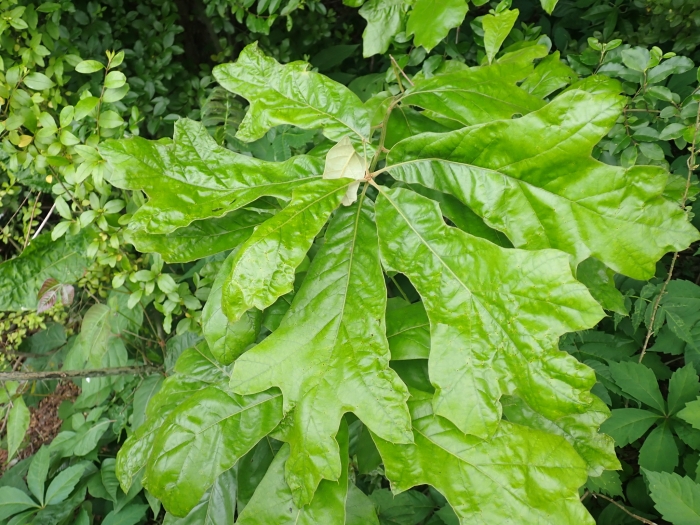Southern Red Oak
(Quercus falcata)
Southern Red Oak (Quercus falcata)
/
/

Cole Shoemaker
CC BY 4.0
Image By:
Cole Shoemaker
Recorded By:
Copyright:
CC BY 4.0
Copyright Notice:
Photo by: Cole Shoemaker | License Type: CC BY 4.0 | License URL: http://creativecommons.org/licenses/by/4.0/ | Rights Holder: Cole Shoemaker | Publisher: iNaturalist | Date Created: 2021-05-18T17:03:12-07:00 |






























































Estimated Native Range
Summary
Quercus falcata, commonly known as Southern Red Oak, is a deciduous tree native to a variety of habitats including dry upland forests, forest edges, and occasionally in more moist, bottomland areas of the Eastern United States. It can grow to a height of 25–30 meters (82–98 feet) with a trunk diameter up to 1.5 meters (5 feet). The Southern Red Oak has a rounded to irregular crown with a variable and often open canopy structure. Its leaves are deeply lobed with bristle tips, turning yellow-brown to red in the fall. The bark is dark, with broad ridges and deep furrows. Acorns are an important food source for wildlife.
This species is valued for its adaptability to a range of soil types and conditions, making it suitable for urban planting, large gardens, and reforestation projects. It is hardy in USDA Zones 5a to 9b, tolerating temperatures as low as -28.8°C (-20°F) and as high as 38°C (100°F). Southern Red Oak requires full sun for optimal growth and prefers medium to well-drained soils. While it is generally easy to maintain, it can be susceptible to oak wilt and other fungal diseases. Its deep taproot system can make transplanting mature trees difficult, but it is not typically known for having aggressive roots that cause problems in urban settings.CC BY-SA 4.0
This species is valued for its adaptability to a range of soil types and conditions, making it suitable for urban planting, large gardens, and reforestation projects. It is hardy in USDA Zones 5a to 9b, tolerating temperatures as low as -28.8°C (-20°F) and as high as 38°C (100°F). Southern Red Oak requires full sun for optimal growth and prefers medium to well-drained soils. While it is generally easy to maintain, it can be susceptible to oak wilt and other fungal diseases. Its deep taproot system can make transplanting mature trees difficult, but it is not typically known for having aggressive roots that cause problems in urban settings.CC BY-SA 4.0
Plant Description
- Plant Type: Tree
- Height: 60-80 feet
- Width: 40-50 feet
- Growth Rate: Moderate
- Flower Color: N/A
- Flowering Season: Spring
- Leaf Retention: Deciduous
Growth Requirements
- Sun: Full Sun
- Water: Medium
- Drainage: Medium, Fast
Common Uses
Bee Garden, Bird Garden, Butterfly Garden, Deer Resistant, Drought Tolerant, Rabbit Resistant, Street Planting
Natural Habitat
Dry upland forests, forest edges, and moist bottomland areas
Other Names
Common Names: Spanish Oak, Bottomland Red Oak, Three-Lobed Red Oak, Chêne Rouge, Spansk Ek
Scientific Names: , Quercus falcata, Quercus falcata var. falcata, Quercus falcata var. triloba, Quercus digitata, Quercus triloba, Quercus aurea, Quercus hudsoniana, Quercus rubra var. triloba, Quercus nigra var. falcata
GBIF Accepted Name: Quercus falcata Michx.